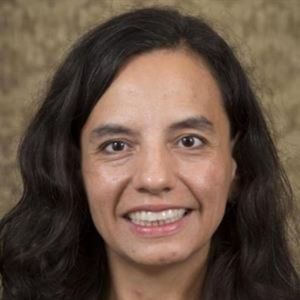
Jacqueline Fajardo
Biography
Jacqueline L. Fajardo is an Assistant Professor in the Department of Chemistry and Biochemistry at the University of Delaware, where she leads innovative efforts in chemistry education reform and interdisciplinary curriculum design. She develops and teaches first-year Honors General Chemistry integrated in a coordinated and intentional alignment with Integrated Honors Introductory Biology, serving life science, health science, and biomedical engineering majors. Her courses engage students through active learning, authentic research experiences, and interdisciplinary problem-solving, bridging molecular principles of chemistry with systems-level perspectives in biology. She also teaches elementary biochemistry, emphasizing how molecular structure and reactivity underpin the complexity of biological function.
Dr. Fajardo additionally contributes to the Interdisciplinary Sciences Learning Laboratories (ISLL) Tutoring Center, which supports hundreds of STEM students each semester through inclusive academic programming, peer mentoring, and leadership development. Through the collective efforts of dedicated faculty, staff, and students over the past decade, ISLL has evolved into a vibrant hub for interdisciplinary teaching and mentoring. Dr. Fajardo has helped design inclusive programming and professional development opportunities that link undergraduates, graduate assistants, and faculty in shared support of STEM learning.
Current Research
My work centers on the CHEM103/104 General Chemistry series. The traditional version of these courses comprise of science and engineering students who do not have a major emphasis in chemistry or chemical engineering, yet require a strong foundation in chemistry on which to build upon. I strive to foster a continuous learning environment so that, through their experiences in lecture, laboratory, workshop and unscheduled time in between, our students are immersed in the study of chemistry.
Representative Publications
Wasacz, J., Fajardo, J. & Suits, J. (2006) Online collaborative learning in a science laboratory course: Student-generated inferences and misconceptions. In E. Pearson & P. Bohman (Eds.), Proceedings of World Conference on Educational Multimedia, Hypermedia and Telecommunications, pp. 1336-1343.
Hilsenbeck (Fajardo) JL, Park H, Chen G, Youn B, Postle K, Kang C. (2004) Crystal structure of the cytotoxic bacterial protein Colicin B at 2.5 A resolution. Mol Microbiol, Vol. 51, No. 3, pp. 711-720.
Park H, Hilsenbeck (Fajardo) JL, Kim HJ, Shuttleworth WA, Park YH, Evans JN, Kang C. (2004) Structural studies of Streptococcus pneumoniaeEPSP synthase in unliganded state, tetrahedral intermediate-bound state and S3P-GLP-bound state. Mol Microbiol. Vol. 51, No. 4, pp. 963-971.
Selected Speaking Engagements
Use of animations as a tool to elicit mental models of undergraduate students enrolled in a GOB course [Invited Speaker] - American Chemical Society 239th National Meeting and Exposition. September 1, 2011, Denver, CO.
Crystal Structure of the cytotoxic bacterial protein Colicin B at 2.5 Å resolution [Invited Speaker] -Adams State College, February 4th, 2011, Alamosa, CO.
Identification of misconceptions held by high school general chemistry students within a POGIL-based learning environment - Biennial Conference on Chemical Education, August 2, 2010, Denton, TX.
Selected Poster Presentations
Student’s use of an online animation to visualize heat-induced protein denaturation in a GOB classroom (Poster), Gordon Research Conference – Visualization, Bryant University, July 10-15, 2011 Smithfield, RI.
Reasoning capabilities and conceptual gain in POGIL high school chemistry (Poster), Gordon Research Conference – Chemical Education: Research and Practice, June 26-July 1, 2011, Davidson, NC.
Assessment strategies for POGIL-based implementation in high school general chemistry classrooms – (Poster) Gordon Conference Chemical education: Research and Practice, June 21-26, 2009, Colby College, Waterville, ME.

